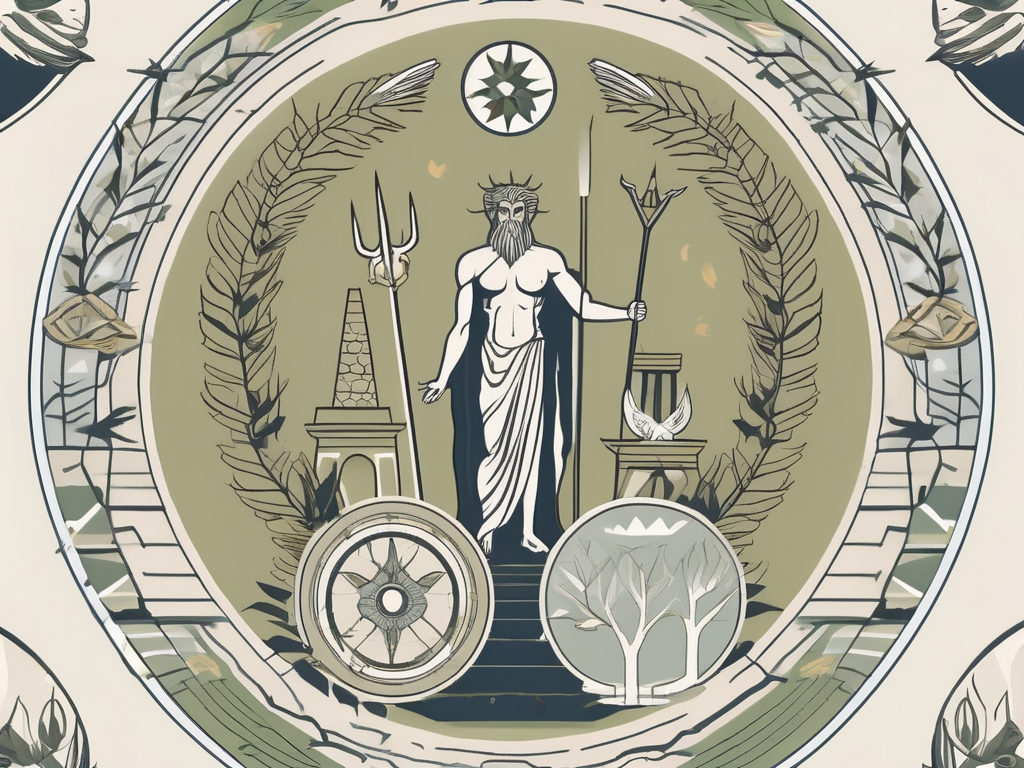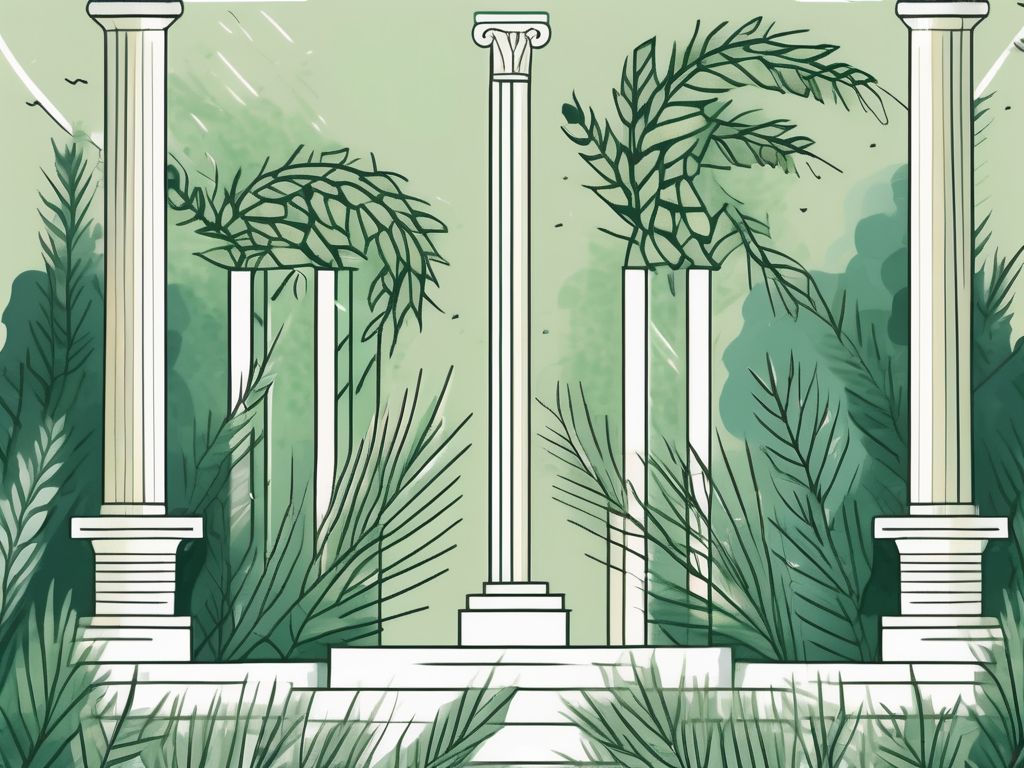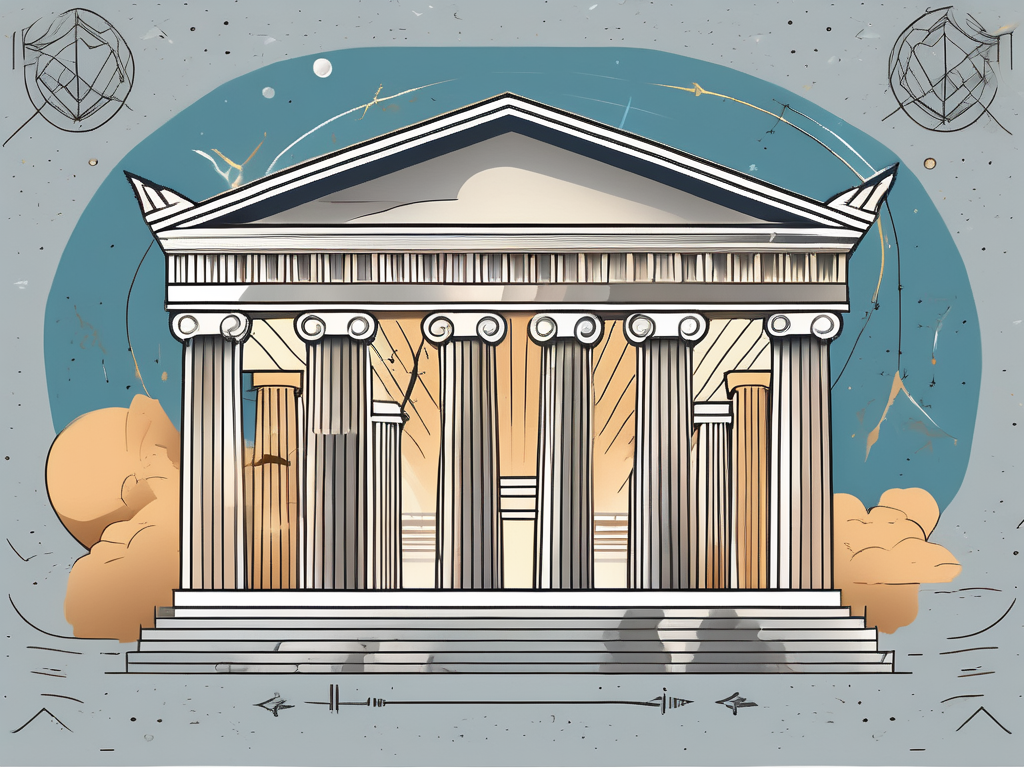The ancient Greeks had a fascination with the gods and goddesses that ruled over different aspects of life. One of the most intriguing figures in Greek mythology is Aphrodite, the goddess of love and beauty. In this article, we will dive deep into the myth and symbols surrounding Aphrodite, examine her influence on love and relationships, explore her embodiment of divine beauty, and discuss her enduring legacy in modern culture.
Understanding the Myth of Aphrodite
Let’s start by unraveling the captivating myth of Aphrodite’s birth. According to ancient legends, she emerged from the foam of the sea, known as the sea foam or sea froth, created when the severed testicles of the Titan Uranus fell into the ocean. This origin story itself reflects Aphrodite’s connection to the raw beauty and chaotic forces of nature.
The sea foam, in all its ethereal glory, danced upon the waves, shimmering under the golden rays of the sun. It was from this enchanting foam that the goddess of love and beauty emerged, fully formed and radiating an otherworldly charm. As she stepped onto the shores of Cyprus, flowers bloomed beneath her feet, symbolizing her power to bring forth beauty and desire.
Aphrodite’s birth signifies the transformative nature of beauty and the ability of love to emerge in unexpected and unconventional ways. It reminds us that beauty can arise from chaos, just as love has the capacity to heal and bring harmony.
The Birth of Aphrodite: A Tale of Beauty from Chaos
In this enchanting tale, Aphrodite rises from the sea foam fully grown and strikingly beautiful. The sea, captivated by her presence, seemed to hush in awe as she emerged, her radiant beauty casting a spell on all who beheld her. Her eyes, the color of the ocean itself, held the secrets of love and desire.
Legends whispered that the sea foam clung to her skin like a delicate veil, accentuating her flawless form. Her golden hair cascaded down her back, kissed by the sun and adorned with pearls gifted by the sea creatures who reveled in her arrival.
As she took her first steps on the sandy shores, the earth itself seemed to tremble with anticipation. The air was filled with the sweet scent of blooming flowers, their petals unfurling in a symphony of colors as if paying homage to the goddess who brought beauty to the world.
Aphrodite’s arrival on Cyprus marked the beginning of a new era, where love and desire would reign supreme. The island, forever blessed by her presence, became a sanctuary for lovers, a place where passion blossomed like the flowers beneath her feet.
Aphrodite’s Role in Greek Mythology
As the goddess of love and beauty, Aphrodite played a significant role in Greek mythology. Her influence extended beyond the realm of mortals, reaching even the gods themselves. It was said that her enchanting presence could ignite the flames of desire in the hearts of both mortals and immortals alike.
Aphrodite’s power was not limited to mere attraction; she held sway over the very essence of love itself. She guided the hearts of lovers, ensuring that their paths crossed and their unions were harmonious. Her divine intervention in matters of the heart led to countless tales of love, passion, and sometimes, tragedy.
One such tale tells of the forbidden love between the mortal prince, Anchises, and the goddess herself. Aphrodite, captivated by Anchises’ beauty and charm, disguised herself as a mortal woman and approached him. Their union resulted in the birth of Aeneas, a hero destined to play a pivotal role in the founding of Rome.
Another story speaks of the love affair between Aphrodite and the god of war, Ares. Their passionate and tumultuous relationship was the stuff of legends, with their clandestine meetings and fiery encounters causing ripples in the divine realm. Their union bore fruit in the form of Harmonia, a goddess who embodied the delicate balance between love and war.
Aphrodite’s role as a deity meddling in the affairs of mortals and gods alike added a touch of intrigue and unpredictability to Greek mythology. Her presence was a constant reminder of the power of love and the transformative nature of beauty.
Aphrodite’s Influence on Love and Relationships
No discussion about Aphrodite would be complete without exploring her impact on love and relationships in Greek mythology.
Aphrodite and the Concept of Love in Greek Mythology
In Greek mythology, love was not confined to romantic ideals but encompassed a wide range of feelings and connections. Aphrodite embodied this multifaceted concept of love, covering everything from passionate desire and physical attraction to deep emotional connections and even divine compassion.
She reminded the ancient Greeks that love is not always straightforward, often involving sacrifices and challenges. Aphrodite’s presence in mythology served as a reminder to embrace the complexities and transformative power of love.
Aphrodite’s Lovers and Affairs: A Glimpse into Divine Relationships
Aphrodite’s influence extended beyond mortal affairs, as she had numerous affairs with both gods and mortals. One of her most famous lovers was Ares, the god of war, with whom she had several children. This turbulent relationship is a testament to the interplay between love and conflict.
Her liaison with the mortal Adonis is another well-known tale. Adonis, known for his extraordinary beauty, aroused jealousy among both gods and mortals. His tragic fate further emphasizes Aphrodite’s association with both the pleasures and pains of love.
Through these stories, Aphrodite highlights the complexities of relationships and reminds us that even the gods face challenges in matters of the heart.
The Power of Aphrodite: Manipulation and Influence in Love Matters
While Aphrodite’s influence on love is often depicted as positive and uplifting, she also possessed a more manipulative side. In Greek mythology, she was known to use her beauty and allure to sway the emotions and actions of both mortals and gods.
This aspect of Aphrodite’s power is particularly evident in the tale of Helen of Troy. It is said that Aphrodite promised the most beautiful woman on Earth to Paris, thus igniting the Trojan War. This manipulation showcases the immense influence Aphrodite held over matters of love and desire.
Aphrodite as the Goddess of Beauty
Beyond her role as the goddess of love, Aphrodite was revered for her unparalleled beauty. Her physical attributes and rituals surrounding beauty played a significant role in Greek culture.
The Physical Attributes of Aphrodite: Defining Divine Beauty
Aphrodite was often depicted as a stunning woman with golden hair cascading down her shoulders, sparkling blue eyes that held a hint of mystery, and a mesmerizing smile that could enrapture anyone who beheld it.
Her flawless and youthful appearance captivated the hearts and minds of both mortals and gods alike, solidifying her status as the epitome of divine beauty. Through her physical form, she reminded the Greeks of the power that beauty holds in shaping human experiences and perceptions.
Aphrodite’s Beauty Rituals and Their Significance
Aphrodite’s beauty rituals were an essential part of her divinity. She would often bathe in sacred springs or pools associated with her, anointing herself with precious oils and perfumes to enhance her allure.
These rituals were not merely acts of vanity but held deeper symbolism. They represented the importance of self-care and the connection between physical and emotional well-being. Aphrodite encouraged mortals to embrace their own beauty and to indulge in self-love and self-care.
The Impact of Aphrodite’s Beauty on Mortals and Gods
Aphrodite’s immense beauty had a profound impact on mortals and gods alike. Mortals sought to emulate her beauty, resorting to cosmetics, beauty treatments, and even sacrifices to win her favor. Her presence often caused love and desire to flourish, bringing both joy and turmoil to the lives of those touched by her beauty.
The impact of Aphrodite’s beauty extended beyond the physical realm. She served as a reminder that beauty has the power to transform, elevate, and inspire. Her influence on mortal and divine affairs reflected the profound effect that beauty can have on shaping human experiences and relationships.
Aphrodite’s Legacy in Modern Culture
The enduring appeal of Aphrodite can be seen in her continued presence in literature, art, and contemporary society.
Aphrodite in Literature and Art
Throughout history, Aphrodite has been a recurring muse for countless artists, writers, and poets. Her timeless beauty and profound connection to love continue to inspire creative expression. From Botticelli’s “The Birth of Venus” to Shakespeare’s sonnets, her presence in art and literature attests to her enduring allure.
Aphrodite’s Influence on Modern Perception of Love and Beauty
Aphrodite’s legacy also extends to modern perceptions of love and beauty. Her archetype lives on in the concept of the idealized feminine form and the pursuit of everlasting love.
As society continues to grapple with the complex nature of love and beauty, Aphrodite’s influence reminds us to embrace the transformative power of these forces and to find the beauty within ourselves and in the world around us.
The Enduring Appeal of Aphrodite in Contemporary Society
Aphrodite’s enduring appeal can be witnessed in contemporary culture, where her influence is evident in all facets of life. Whether in fashion, beauty trends, or even the desire for passionate and fulfilling relationships, Aphrodite’s legacy remains alive and well.
Her myth serves as a reminder of the beauty and complexities of the human experience and compels us to seek out love and beauty in our own lives.
So, the next time you gaze into the mirror or find yourself captivated by the loveliness of the world, remember Aphrodite, the mythical goddess who embodies the transformative power of love and beauty.












